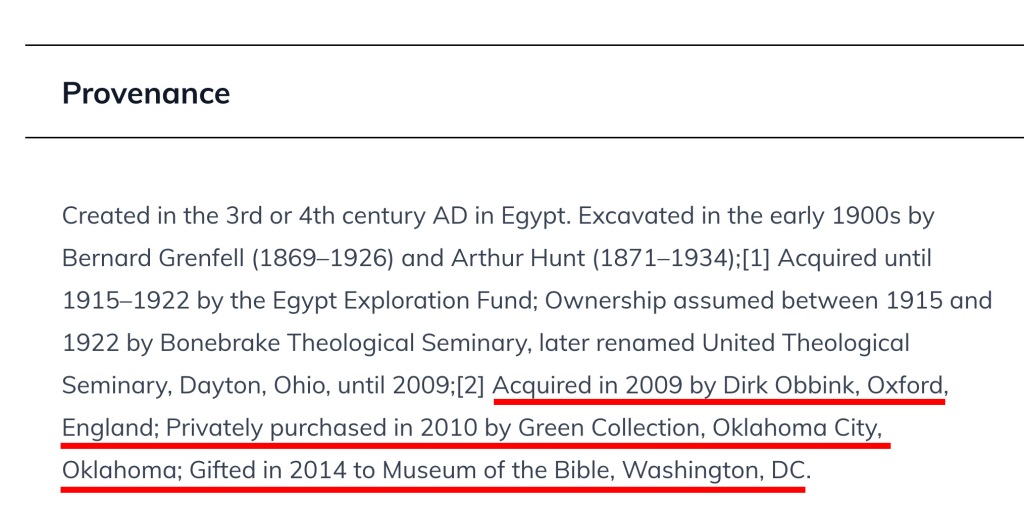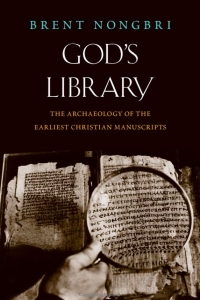In 2023, the civil case of Hobby Lobby Stores, Inc. v. Dirk D. Obbink switched venues from New York to Oklahoma City. The Oklahoma court has now found a default judgement in favor of Hobby Lobby, with the result that Professor Obbink is now obligated to pay Hobby Lobby “$7,085,100.00, together with prejudgment interest from February 5, 2013, at the rate of 6% per annum, as specified in 15 Okla. Stat. § 266, postjudgment interest at the rate provided in 28 U.S.C § 1961 until the judgment is satisfied, and attorney’s fees and costs.”
The complaint alleges that Professor Obbink sold Hobby Lobby 32 papyri that turned out to have been stolen from the collection of the Egypt Exploration Society. The original complaint contains a list of seven purchases Hobby Lobby made from Professor Obbink between 2010 and 2013, outlined by Lynda Albertson in a post yesterday (which also has a nice summary of the whole affair).
There are a couple interesting statements in the complaint document, which is often identical with the original New York filing. This statement was in the original filing, but I breezed right by it:
“Obbink, one of the world’s leading scholars of ancient papyri, also acted throughout his career as a private dealer of papyri fragments and other antiquities to the world’s greatest museums and private collectors.”
Is this actually accurate? I wonder if Hobby Lobby has evidence to back up the statement about sales to other museums. Did Professor Obbink in fact sell to others outside the community of wealthy Christian collectors in the US? If so, might there be more missing EES pieces in other collections?
I think it’s also worth emphasizing a statement that I highlighted before when the New York complaint was filed:
“The fact that some unknown number of the Fragments were stolen renders all the Fragments unsalable and worthless to Hobby Lobby, which stands to lose both the Fragments and the entire value of the Purchase Price it paid to Obbink.”
If Professor Obbink has acted as Hobby Lobby alleges, he should of course be held accountable. But it’s worthwhile to reflect on how “worthless” the stolen fragments actually were to Hobby Lobby. One of the aspects of the Hobby Lobby and Museum of the Bible relationship that was amply documented by Candida Moss and Joel Baden was that Hobby Lobby would buy manuscripts and other artifacts, have them appraised at higher values than they paid, donate them to the Museum of the Bible, and then take a tax write-off for the higher amount. As Baden and Moss write (Bible Nation, p. 25):
“The financial incentive to donate items, and reap the substantial tax write-off, is commonplace among serious art and antiquities collectors; this is how many museums have traditionally acquired much of their holdings. Part of what sets the Greens apart from other collectors, however, is that when they donate pieces from their collection, they give them to their own nonprofit organization. When, in 2015, we asked Steve Green how the family decides what artifacts to donate to the Museum of the Bible, he candidly responded that the decision was financial: “I don’t know that there’s a lot of rhyme and reason to it. . . . We want to donate X amount and we can do it with this, and that’s easy so we’ll do it.” Once donated to the Museum, however, the items never truly leave the Greens’ control. The charitable organization known as Museum of the Bible, Inc. (MOTB) is also based at Hobby Lobby, Inc., in Oklahoma City. Once the bricks-and-mortar museum opens in D.C. the artifacts will be transferred there, but the museum, as we will see later in this book, effectively remains under Green control.”
Items bought from Professor Obbink do seem to have been among those that Hobby Lobby donated to the Museum of the Bible, as the Museum records for some of the Distribution Papyri indicate. This is the provenance information associated with P.Oxy. 1353:

Now, the model that Moss and Baden describe, and which Scott Carroll used in his own business, Ancient Asset Investment, refers to a minimum 3-to-1 return for people who buy antiquities and then donate them to non-profit organizations. One of the videos in which Carroll promoted this plan in 2014 is very explicit on this point. The host of the event, Marshall Foster, says “So a person who wants a tax write-off that’s major, I mean, so that you don’t pay taxes for the next year and a half, two years, uh you buy one of these treasures, and it’s, it’s a legal, uh, way to do it.”
The Hobby Lobby v. Obbink complaint notes that aside from the seventh purchase from Professor Obbink (which involved the four gospel fragments), the other six purchases were all delivered: “Obbink sent the Fragments at issue in the Action from the United Kingdom to Hobby Lobby in Oklahoma City, where Hobby Lobby is headquartered.” So, if Hobby Lobby did appraise these items, donate them to the Museum of the Bible, and take the tax deduction, it would seem that Hobby Lobby may have managed to extract considerable value out of these “worthless” papyrus and parchment fragments after all.



Brent, Just very quickly to say how much I enjoy every one of your Variant Readings; usually, the best reading in my inbox – all best, Paul
Paul Needham
Just noting the similarity of the name of Carroll’s recent business with the title of your book https://www.godsancientlibrary.com/dr-scott-carroll.
Of course they could always honest up and revise their tax returns and pay more taxes.
And yes, I save these posts to read with popcorn.
Pingback: Archaeology 2024-03-30 – Ingram Braun
But they’re Christians, Brent, so they’re not in this for the money. It’s all for the greater glory of God, right?